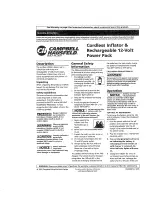
8
SPECIFIC WARNINGS AND SAFETY RULES
FOR ROTARY TOOL
Safety Warnings Specific for Sanding
Operations:
• Do not use excessively oversized sanding disc paper.
Follow manufacturers recommendations, when selecting
sanding paper. Larger sanding paper extending beyond
the sanding pad presents a laceration hazard and may
cause snagging, tearing off the disc or kickback.
Safety Warnings Specific for Polishing Operations:
• Do not allow any loose portion of the polishing bonnet or
its attachment strings to spin freely. Tuck away or trim any
loose attachment strings. Loose and spinning attachment
strings can entangle your fingers or snag on the
workpiece.
Safety Warnings Specific for Wire Brushing
Operations:
• Be aware that wire bristles are thrown by the brush even
during ordinary operation. Do not overstress the wires by
applying excessive load to the brush. The wire bristles can
easily penetrate light clothing and/or skin.
• If the use of a guard is recommended for wire brushing, do
not allow any interference of the wire wheel or brush with
the guard. Wire wheel or brush may expand in diameter
due to workload and centrifugal forces.
Additional Safety Warnings
• The arbor size of wheels, sanding drum or any other
accessory must properly fit the spindle or collet of the
power tool. Accessories that do not match the mounting
hardware of the power tool will run out of balance, vibrate
excessively and may cause loss of control.
• Mandrel mounted wheels, sanding drums, cutters or other
accessories must be fully inserted into the collet or chuck.
The “overhang” or the length of the mandrel from the
wheel to the collet must be minimal. If the mandrel is
insufficiently held and/or the overhang of the wheel is too
long, the mounted wheel may become loose and ejected
at high velocity.
• After changing the bits or making any adjustments, make
sure the collet nut, chuck or any other adjustment devices
are securely tightened. Loose adjustment devices can
unexpectedly shift, causing loss of control, loose rotating
components will be violently thrown.
• Maintain a firm grip on the power tool and position your
body and arm to allow you to resist kickback forces.
Always use auxiliary handle, if provided, for maximum
control over kickback or torque reaction during start-up.
The operator can control torque reactions or kickback
forces, if proper precautions are taken.
• Never place your hand near the rotating accessory.
Accessory may kickback over your hand.
• Do not position your body in the area where power tool
will move if kickback occurs. Kickback will propel the tool
in direction opposite to the wheel’s movement at the point
of snagging.
• Use special care when working corners, sharp edges etc.
Avoid bouncing and snagging the accessory. Corners,
sharp edges or bouncing have a tendency to snag the
rotating accessory and cause loss of control or kickback.









































